Chemistry is the lovechild of math and science.
At least that’s what I tell my students. That’s also why I use a 10 question math pretest every year.
Why a pretest? Won’t students get math throughout the year?
Come progress report time, I bet you’re going to find a few chemistry honors or regular students who just don’t get chemistry. Or equally as tricky, students that aren’t being challenged. If you want to have a student move a level down, or up, you need to talk to your APC.
Your APC (Assistant Principal of Curriculum) will need evidence and I find that it’s hard to gather data after having students in my class for one week. Yes, that’s right, level changes need to happen within a week or two from when school starts. Bananas. I know.
It’s difficult to predict student chemistry performance based on their state testing or past science class(biology is a drastically different beast than chemistry). I need evidence to support moving a student down or up a level. We need more data points. So how can one identify these students who are in need of a level change within the first week and a half of school?
Math.
Your students will be using algebraic math for topics like conversions, lab work, thermodynamics, stoichiometry, moles, acids and bases, electrochemistry and gas laws. The exception being if you teach a highly conceptual version of chemistry. Chemistry uses a ton of math to quantifiably support claims. Some of the math is easier, like converting temperatures from Celsius to Kelvin. Other chemistry math is tricker and requires more practice, like gas laws, stoichiometry (my fav!), or thermodynamic.
The past few years I have my chem honors and regular students take a 10 question math pretest. It includes topics like:
- Scientific Notation
- Converting Decimals to Fractions
- Dividing Fractions
- Density Equations
- Ratios
- Single Variable Algebra
The students trade and grade the pretest, but its not considered for a grade. It’s hard to prep for a pretest and I don’t want to tank their grade if the summer fog hasn’t cleared yet.
However, I do document the mental math results.
All of the topics included on the 10 question math pretest foreshadow skills needed for success in later units.
I use the math pretest as a review opportunity and fact-finding mission. Knowing I can teach the math as I know how they’ll encounter it in my class, I evaluate the highs and lows of results.
Once I have the results from the quiz, I take a deep dive into the records of any honors student who scored a 20% or lower. Any regular chemistry students who score 80% or higher I consider moving into honors.
I speak to their previous science and math teachers. I talk to the student and the parent about the expectations of my respective classes. Then I let them decide if they wish to move. On occasion I am more persistent than others dependent on my research. All within the first week and a half of school.
But you know what?
I haven’t had that annoyance of wanting to move a student part way through the first quarter in about three years. Making groups based on student performance is easier, my scores are higher, and I don’t have have as many grade grubbing conversations when reports cards are due.
You could make your own quiz during your preplanning week or even this weekend. Or you could save time and buy my 10 question math pretest, complete with an answer key and student data tables.

I’d love to hear from you. How do you determine level changes? Do you use a math pretest? Reply and let me know!
Happy Teaching,
B




